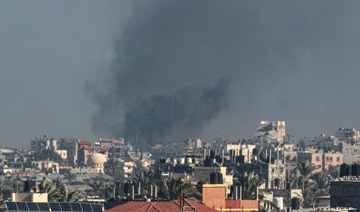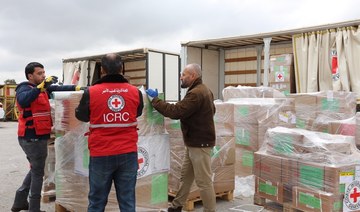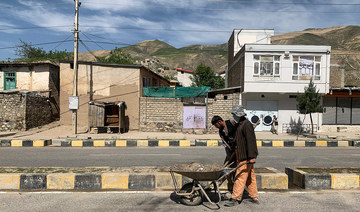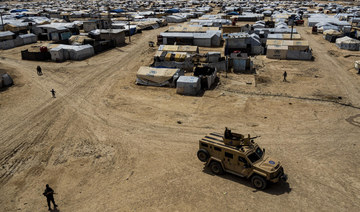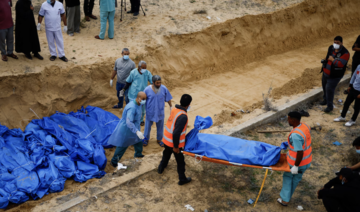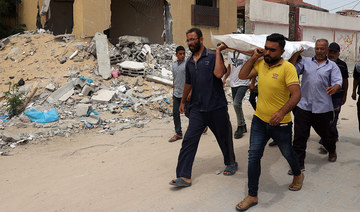GAZA: Health officials in Hamas-ruled Gaza said Saturday that Israeli strikes killed at least 60 people in the besieged territory, 99 days into the war.
Fears of the conflict widening intensified after US and British forces struck pro-Hamas Houthi rebels in Yemen following attacks on Red Sea shipping, with the US military announcing a fresh air strike on Saturday, a day after the initial barrage.
Witnesses in the Gaza Strip reported early-morning Israeli bombardment. An AFP correspondent said intense shelling and air strikes hit the south of Gaza overnight.
Nimma Al-Akhras, 80, described the strike that destroyed her home.
“It was very powerful,” she said. “We started to scream and I couldn’t move but someone pulled me out and put me on a cart.”
The Israeli army said its forces had struck dozens of rocket launchers that were “ready to be used” in central Gaza, and eliminated four “terrorists” in air strikes on Khan Yunis, Gaza’s main southern city.
The military also reported that its engineers had destroyed a Hamas “command center” and weapons found there, after a raid in central Gaza.
Health ministry spokesman Ashraf Al-Qudra reported “more than 60 martyrs” in Israeli air strikes and artillery fire overnight, with dozens more wounded.
Israel’s relentless bombardment of Gaza since Hamas’s October 7 attack has killed at least 23,843 people, mostly women and children, according to the latest ministry toll.
The war, in which Israel has vowed to destroy Hamas, began when the militants launched their unprecedented attack that resulted in about 1,140 deaths in Israel, mostly civilians, according to an AFP tally based on official figures.
At Rafah’s Al-Najjar hospital, mourners gathered and prayed around the bodies of slain relatives. One man stroked the body of a child, wrapped up like a white parcel. He kissed it, then placed it gently among others.
Another man, Bassem Araf, held up a photo of another child.
“She died hungry with bread in her hand. We tried to remove the bread from her hand but it was held tight,” Araf said. “This is the resistance they are targeting in Gaza, just children.”
An AFP reporter in Rafah said telecommunications had been partially restored, a day after Gaza’s main operator Paltel reported the latest outage. Paltel did not immediately confirm the service restoration.
Winter rains have exacerbated the dire humanitarian situation in Gaza, where the UN estimates 1.9 million — nearly 85 percent of the population — have been displaced.
Many have sought shelter in Rafah and other southern areas where the health ministry says there isn’t the infrastructure to support them.
“The infrastructure, services and health care in Rafah are fragile and cannot bear the needs of 1.3 million citizens and displaced people,” its spokesman said.
The United Nations humanitarian office, OCHA, told AFP that Israel was blocking aid convoys into northern Gaza.
“They have been very systematic in not allowing us to support hospitals,” OCHA’s head for the Palestinian territories, Andrea De Domenico, said on Friday decrying “a level of inhumanity... beyond comprehension.”
The health ministry spokesman accused Israel of “deliberately targeting hospitals... to put them out of service,” warning of “devastating repercussions.”
Hospitals, protected under international humanitarian law, have repeatedly been hit by Israeli strikes in Gaza since the war erupted.
The Israeli military accuses Hamas of operating command centers in tunnels under hospitals, a charge denied by the Islamist group.
Fewer than half of Gaza’s hospitals are functioning and those only partly, the World Health Organization says.
In Israel, concern grew for hostages held in Gaza as they approach their 100th day in captivity.
Palestinian militants on October 7 seized about 250 hostages, 132 of whom Israel says remain in Gaza, including at least 25 believed to have been killed.
The office of Israeli Prime Minister Benjamin Netanyahu — under domestic pressure to get the hostages home — said on Friday a deal had been negotiated with Qatar to get medicine to the captives.
“It’s not enough. I want him home, in hospital, in a good health care, not in Hamas health care,” Ella Ben Ami, daughter of hostage Ohad Ben Ami, 55, said in Tel Aviv.
Bombing and deprivation didn’t stop Gaza couple Afnan Jibril and Mustafa Shamlakh, displaced by the war, from getting married in Rafah.
“We are all living through the same tragedy. However, we must continue to live, and life should go on,” said Ayman Shamlakh, the groom’s uncle.
In the Israeli-occupied West Bank, where violence has surged during the Israel-Hamas war, Israeli troops killed three militants after they attacked a Jewish settlement, the army said.
It said there had been a “terrorist infiltration” in the Adora settlement, about 20 kilometers (12 miles) west of Hebron, and soldiers had come under fire.
Palestinian news agency Wafa identified the three killed as a 19-year-old and two 16-year-olds.
The International Court of Justice this week heard arguments in a case launched by South Africa — and welcomed by Gazans — accusing Israel of breaching the UN Genocide Convention in the Gaza war. The case seeks a halt to Israel’s military campaign.
Israel stressed to the court that its response was in self-defense and not aimed at Palestinian residents.
The court is likely to make an initial ruling within weeks.
On 99th day of war, Gaza ministry says dozens killed in Israel strikes
https://arab.news/99x9a
On 99th day of war, Gaza ministry says dozens killed in Israel strikes

- Fears of the conflict widening have grown after US and British forces struck pro-Hamas Houthi rebels in Yemen
- UN aid chief calls anew for Gaza ceasefire, urges UN action to end war
Fighting with 'heavy weaponry' in Sudan's El-Fasher: UN

- The United States last month warned of a looming rebel military offensive on the city, a humanitarian hub that appears to be at the center of a newly opening front in the country’s civil war
PORT SUDAN: A senior UN official expressed concern late Saturday at reports that heavy weapons were being used in fighting in the Sudanese city of El-Fashur.
Wounded civilians were being rushed to hospital and civilians were trying to flee the fighting in the Darfur region, said a statement from Clementine Nkweta-Salami, the UN’s humanitarian coordinator for Sudan.
“I am gravely concerned by the eruption of clashes in (El-Fashur) despite repeated calls to parties to the conflict to refrain from attacking the city,” said Nkweta-Salami.
“I reiterate — the violence threatens the lives of over 800,000 civilians” who live in the city.
“I am equally disturbed by reports of the use of heavy weaponry and attacks in highly populated areas in the city center and the outskirts of (El-Fashur), resulting in multiple casualties,” she added.
The United States last month warned of a looming rebel military offensive on the city, a humanitarian hub that appears to be at the center of a newly opening front in the country’s civil war.
Tunisian police arrest prominent lawyer critical of president

- Dozens of lawyers took to the streets in protest on Saturday night, carrying banners reading “Our profession will not kneel” and “We will continue the struggle” Saied came to power in free elections in 2019
TUNIS: Tunisian police stormed the building of the Deanship of Lawyers on Saturday and arrested Sonia Dahmani, a lawyer known for her fierce criticism of President Kais Saied, and then arrested two journalists who witnessed the confrontation, a journalists’ syndicate said.
Two IFM radio journalists, Mourad Zghidi and Borhen Bsaiss, were arrested, an official in the country’s main journalists’ syndicate told Reuters. The incident was the latest in a series of arrests and investigations targeting activists, journalists and civil society groups critical of Saied and the government. The move reinforces opponents’ fears of an increasingly authoritarian government ahead of presidential elections expected later this year.
Dahmani was arrested after she said on a television program this week that Tunisia is a country where life is not pleasant. She was commenting on a speech by Saied, who said there was a conspiracy to push thousands of undocumented migrants from Sub-Saharan countries to stay in Tunisia. Dahmani was called before a judge on Wednesday on suspicion of spreading rumors and attacking public security following her comments, but she asked for postponement of the investigation.
The judge rejected her request. Dozens of lawyers took to the streets in protest on Saturday night, carrying banners reading “Our profession will not kneel” and “We will continue the struggle” Saied came to power in free elections in 2019. Two years later he seized additional powers when he shut down the elected parliament and moved to rule by decree before assuming authority over the judiciary.
Since Tunisia’s 2011 revolution, the country has won more press freedoms and is considered one of the more open media environments in the Arab world. Politicians, journalists and unions, however, say that freedom of the press faces a serious threat under the rule of Saied. The president has rejected the accusations and said he will not become a dictator.
SDF hands over 2 Daesh members suspected in 2014 mass killing of Iraqi troops

- Iraq has, over the past several years, put on trial and later executed dozens of Daesh members over their involvement in the Speicher massacre
BEIRUT: Syria’s US-backed Kurdish-led force has handed over to Baghdad two Daesh militants suspected of involvement in mass killings of Iraqi soldiers in 2014, a war monitor said.
The report by the Syrian Observatory for Human Rights came a day after the Iraqi National Intelligence Service said it had brought back to the country three Daesh members from outside Iraq. The intelligence service did not provide more details.
Daesh captured an estimated 1,700 Iraqi soldiers after seizing Saddam Hussein‘s hometown of Tikrit in 2014. The soldiers were trying to flee from nearby Camp Speicher, a former US base.
BACKGROUND
Daesh captured an estimated 1,700 Iraqi soldiers after seizing Saddam Hussein‘s hometown of Tikrit in 2014.
Shortly after taking Tikrit, Daesh posted graphic images of Daesh militants shooting and killing the soldiers.
Farhad Shami, a spokesman for the Kurdish-led Syrian Democratic Forces, said the US-backed force handed over two Daesh members to Iraq.
It was not immediately clear where Iraqi authorities brought the third suspect from.
The 2014 killings, known as the Speicher massacre, sparked outrage across Iraq and partially fueled the mobilization of militias in the fight against Daesh.
Iraq has, over the past several years, put on trial and later executed dozens of Daesh members over their involvement in the Speicher massacre.
The Observatory said the two Daesh members were among 20 captured recently in a joint operation with the US-led coalition in the northern Syrian city of Raqqa, once the capital of Daesh’s self-declared caliphate.
Despite their defeat in Iraq in 2017 and in Syria in March 2019, the extremist sleeper cells are still active and have been carrying out deadly attacks against SDF and Syrian government forces.
Shami said a car rigged with explosives and driven by a suicide attacker tried on Friday night to storm a military checkpoint for the Deir El-Zour Military Council. This Arab majority faction is part of the SDF in the eastern Syrian village of Shuheil.
Shami said that when the guards tried to stop the car, the attacker blew himself up, killing three US-backed fighters.
No one immediately claimed responsibility for the attack, but it was similar to previous explosions carried out by IS militants.
The SDF is holding over 10,000 captured Daesh fighters in around two dozen detention facilities, including 2,000 foreigners whose home countries have refused to repatriate them.
Protesters return to streets across Israel, demanding hostage release

- Family members of the hostages, carrying pictures of their loved ones still in captivity, joined the crowds that demonstrated in Tel Aviv
TEL AVIV: Thousands of Israelis took to the streets on Saturday demanding that Prime Minister Benjamin Netanyahu’s government do more to secure the release of hostages being held in the Gaza Strip by Islamist group Hamas.
Family members of the hostages, carrying pictures of their loved ones still in captivity, joined the crowds that demonstrated in Tel Aviv.
One of them was Naama Weinberg, whose cousin Itai Svirsky was abducted during Hamas’ Oct. 7 assault on Israeli towns and, according to Israeli authorities, was killed in captivity. In a speech she referenced a video Hamas made public on Saturday, claiming that another of the Israeli captives had died.
“Soon, even those who managed to survive this long will no longer be among the living. They must be saved now,” Weinberg said.
As the evening progressed, some protesters blocked a main highway in the city before being dispersed by police, who used water cannons to push back the crowd. At least three people were arrested.
Hamas’ Oct. 7 attack sparked the devastating war in Gaza, now raging for nearly seven months.
UN Security Council seeks inquiry into mass graves in Gaza

- The UN rights office in late April had called for an independent investigation into reports of mass graves at Al-Shifa and the Nasser Medical Complex in Khan Younis
NEW YORK: The UN Security Council has called for an immediate and independent investigation into mass graves allegedly containing hundreds of bodies near hospitals in Gaza.
In a statement, members of the council expressed their “deep concern over reports of the discovery of mass graves, in and around the Nasser and Al-Shifa medical facilities in Gaza, where several hundred bodies, including women, children and older persons, were buried.”
The members stressed the need for “accountability” for any violations of international law.
They called on investigators to be given “unimpeded access to all locations of mass graves in Gaza to conduct immediate, independent, thorough, comprehensive, transparent and impartial investigations.”
FASTFACT
The World Health Organization said in April that Al-Shifa, in Gaza City, had been reduced to an ‘empty shell,’ with many bodies found in the area.
Hospitals in the Gaza Strip have been repeatedly targeted since the beginning of the Israeli military operation in the Palestinian territory following the October 7 attack on southern Israel by Gaza-based Hamas militants.
The World Health Organization said in April that Al-Shifa, in Gaza City, had been reduced to an “empty shell,” with many bodies found in the area.
The Israeli army has said around 200 Palestinians were killed during its military operations there.
Bodies have reportedly been found buried in two graves in the hospital’s courtyard.
The UN rights office in late April had called for an independent investigation into reports of mass graves at Al-Shifa and the Nasser Medical Complex in Khan Younis.
Gaza officials said at the time that health workers at the Nasser complex had uncovered hundreds of bodies of Palestinians they alleged had been killed and buried by Israeli forces.
Israel’s army has dismissed the claims as “baseless and unfounded.”
The statement on Friday from the Security Council did not say who would conduct the investigations.
But it “reaffirmed the importance of allowing families to know the fate and whereabouts of their missing relatives, consistent with international humanitarian law.”
Israel’s offensive has killed at least 34,943 people in the Gaza Strip, primarily women and children, the Health Ministry in the territory said.




